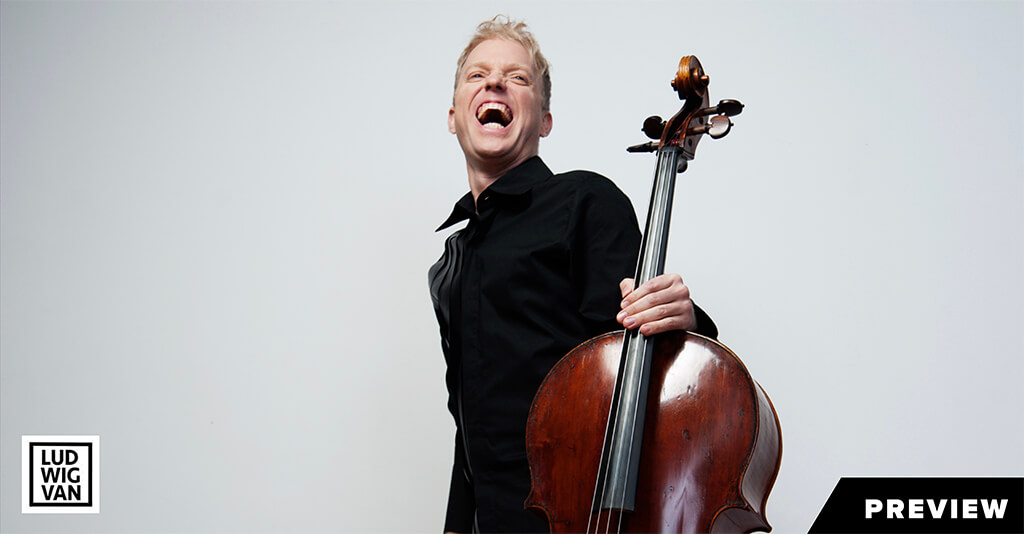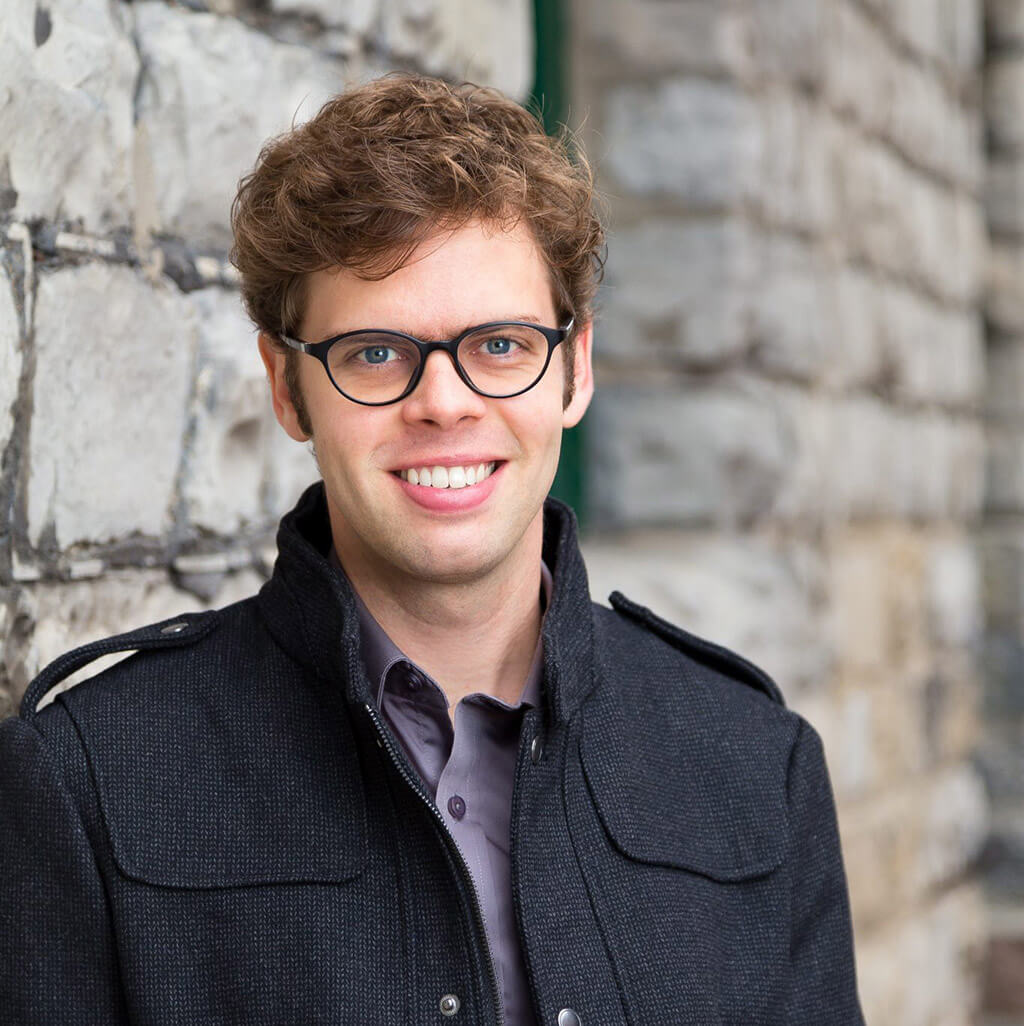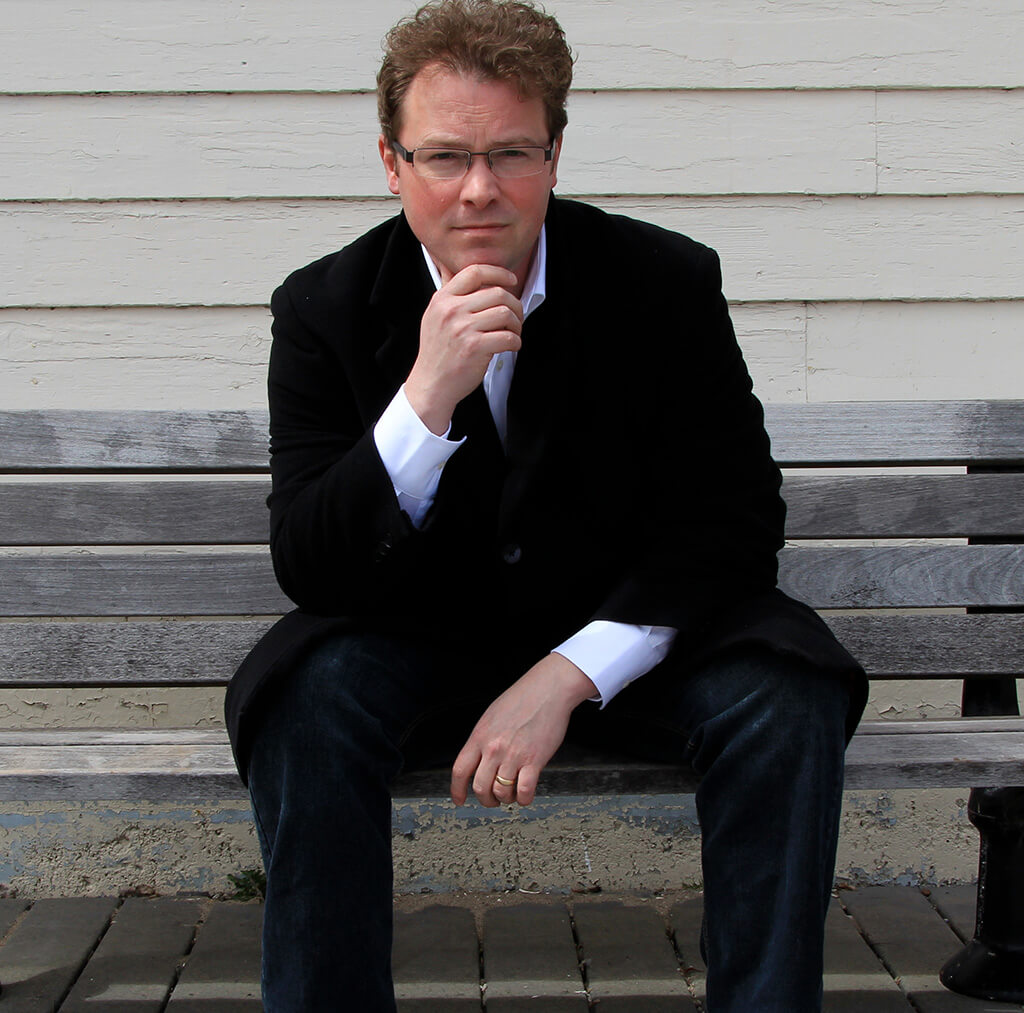
It is interesting to think that new food and fashion trends remain constant public entertainment, yet in classical music, we tend to mostly look backwards to comb through old world favourites. The audience is current, the performers are current, yet live and contemporary composers are rarely featured — until you join the new music community, and experience this unfamiliar territory.
“Going to a new music concert — it can be hard, as people can be afraid of what they don’t know,” explains Joseph Johnson, Principal cellist of the Toronto Symphony Orchestra. “But I’m constantly seeing that people who come to new music are not aficionados, but a lot of them leave with a positive experience.”
Joseph Johnson
Having performed many contemporary cello concertos, including the North American premiere of Peter Eötvös’ Cello Concerto Grosso (2012) with Toronto Symphony Orchestra, and the Canadian premiere of Marc-André Dalbavie’s Cello Concerto (2013) with Esprit Orchestra in 2016, Johnson is well-versed in both the older-and-common standards, and the contemporary classical repertoire. Dipping into all possible roles of classical cello, he is known for solo, chamber and orchestral playing in Toronto; Johson is a true seasoned professional. Yet, this particular project, Unsuk Chin’s Cello Concerto (2006; rev. 2013) is a very special one for Johnson.
Since its premiere in 2009, Chin’s Cello Concerto has been gathering rave reviews, however, its fiendish difficulty has limited its performance — so far, only a single cellist, Alban Gerhardt, has premiered it and given a select few performances. “I might be the second cellist to perform this monumental work,” Johnson says. “Alex [Pauk, artistic director of Esprit Orchestra] called me last June and asked if I would be willing. I’m not under any external pressure to do it, but it is rare, at this point in my career, to play something new… I’m always trying to get better, and it’s a great opportunity to take one something that is so monumental.”
Johnson received the part in late July. “When I opened it, I thought, oh my goodness, what did I get myself into!” he says with laughter. “But I never back down from a challenge. When you do something like this — so huge, you need to do it responsibly, so I made sure to create some time for it, including a week of Banff residency.” Starting the journey slowly, away from the cello, Johnson first looked at all the markings, technical and metronomical: “I looked for clues; what do I need to do to perform this piece? Then I look at the score to figure out where the exposed parts are, and how it all interacts with orchestra, to really try to understand.”
Then, with one month to go before the performance, Johnson left the bustle of everyday life for a week, for total immersion in the world of Unsuk Chin. “I scheduled it one month before the concert, and being able to get out there – not teaching or performing, and just immersing self completely into the world of this piece was so helpful — physically, mentally and emotionally uninterrupted… Though, after five days, I had to stop. I’ve been stretched as far as I’ve ever been physically, mentally and emotionally.” And this process of familiarizing, of learning another person’s world, is the biggest draw for Johnson.
“What I really love for a new piece is that any composer we know, we already know their language. But this is a new person’s language. So many times, with something new, I find it quite frustrating in the beginning, then you start to see, hear and feel their language, patterns and tendencies. This is not a fast process; you have to live with a piece like this for a long time. And the piece is starting to make sense to me, and I can’t wait to the first rehearsal. This is such an amazing time. You spend months by yourself, and for this, there is no piano reduction, so the first rehearsal, it’s like going to a new planet, and discovering how it all exists.”
‘Being stretched’ would be the summary of Johnson’s journey so far with the concerto. “I didn’t realize how much of an emotional toll it would take,” Johnson says.
“Now I feel that I live in this woman’s world. She doesn’t know who I am, yet I’m living her world so extensively – with such highs and lows in the process, it’s been such a roller coaster; physically, mentally and emotionally. I haven’t experienced anything like that since Eötvös’ Cello Concerto Grosso, but having had direct involvement with Eötvös, it is a bit different. I don’t think fun is the right word, perhaps intense… I feel very lucky to have experiences like this — such experience can take a lot from your life, and being stretched as far as you could ever go — it’s an amazing feeling. This piece should be played, but it’s really hard. It’s been a very positive thing, but I am exhausted. It’s really an emotional piece, like the ending: the cello goes higher and higher, way over the fingerboard, with just bass and bass drum… the cello holds the last notes and fades into the space. I can’t imagine what that would feel like, to play that last note in the concert, to feel that journey coming to an end. I will probably have a good cry after that night.”
Chris Thornborrow

Chris Thornborrow is at the other side of the line, composing a brand new piece, Trompe l’œil (2019), for the Grand Slam! Currently, Chris works at the Canadian Opera Company, creating operas from scratch with children in community centres throughout Toronto, and his days are filled with teaching and composing with kids. Though it gets tough at times to find time to delve into his own projects, the chance to write for Esprit Orchestra has been a great experience: “I’ve been consistently going to Esprit concerts since 2006, and have gotten to know some of the players — the Toronto new music community is small! And it’s really fun to suddenly be sitting in the composer’s chair, and to collaborate on a new piece.”
For his commission, Chris drew inspiration from a painting technique, Trompe l’œil, where the illusion of three-dimensions is created on flat surfaces: “I was specifically drawn to The Goldfinch, painted by Carel Fabritus in 1654, which I discovered through reading Donna Tartt’s novel of the same title.” Drawing from birdsong, Chris composed to create musical textures that were analogous to Fabritius’ brush strokes. He is excited for the premiere, yet he is already looking into the next possibility:
“…I would love to collaborate closely with an orchestra, from the gestation to the final version,” explains Thornborrow. “Right now, the structures seem to be that you apply for money, you get a grant, you go away to write a piece, you come back when it’s done, then you discover the piece in rehearsal. Wouldn’t it be amazing if the orchestra was involved in the outset? I believe it would ratchet up the risk-taking and quality of the work to a new level… I feel with how tight-knit the Toronto new music scene is, this might be possible!”
Ryan Scott

Ryan Scott, soloist for Ishii’s Afro Concerto (1982), has a multiple view of the new music scene: “I wear more than one hat as a creator of new music: not a composer, but a performer, producer and collaborator, in an art form that sets me free, intellectually, physically and socially.” LikeJohnson, Ryan spends much time in preparation for performances; however, being a solo percussionist (in this instance), he looks towards the performance with a rather levelled view of the reality of committing to new music: a project may well be a single presentation, meaning it could be years before one gets to perform it again, if ever.
“For the performer, it may not be so appealing, to be honest. It’s a deadline and a moment on which to focus intensely for weeks and mentally prepare for months – no delineated hours, it’s always pressing and all I want to do is nail everything the way I can do it best. This is how I practice every day. And the practice, not the performance, is what drives me. I love playing. Everything about it. I’ll likely never stop. These projects keep me sharp and put everything else into perspective. Including the fact this is not Mozart. All the right notes really matter to me, for me.”
The upcoming performance would be the fourth of four Ishii concerti that Ryan has played with Esprit. And as he has especially adapted himself to play in larger groups and orchestras, Ryan is constantly challenging himself. “It feels very uncomfortable to me, and does not come naturally. But it is a skill I have acquired over many years, with the generous patience of some very select colleagues. I don’t think solo playing comes naturally to many people, including myself – or maybe it does, because I do it… I have learned to not take it for granted. This is a very special part of being a musician: full commitment in the moment. There is no other choice.”
With 25 years of daily participation in Toronto’s new music scene, Ryan is very excited for the future, including this upcoming performance: “I’m not playing in Osaka or Austin, I’m playing at home with my friends behind me. And with the end of media curation and the birth of open online generated media, I hope the new music world is populating. What Toronto is, is growing. I’ve been so lucky to be a part of that, and I even get to play concertos. I mean, wow – not so bad, right? I gotta practice!”
Esprit Orchestra: Grand Slam!
The common drive for Johnson, Chris and Ryan, and the Esprit Orchestra is dedication: to growth, to new experiences and being challenged. Do come out to Grand Slam!, tag along with these brave and inquisitive people, and be curious:
“I want the audience to see how exciting and emotional new music can be. If you really treat it with respect and try to convey what the composer wants to communicate — what this woman really wants to say — I want the audience to have same emotional experience as I am having. Music is going to conjure up emotions in everyone, and you have to allow yourself to experience that emotion. And it could conjure up negative emotions, but at least you have given yourself a chance to experience it. You get to see what gets created out there – the world of living composers. I think it’s important.”
++++
Esprit Orchestra presents Grand Slam! Sunday, March 24, 2019, 8 p.m. at Koerner Hall. Details Here.
LUDWIG VAN TORONTO
Want more updates on Toronto-centric classical music news and reviews? Follow us on Facebook or Twitter for all the latest.
- CRITIC’S PICKS | Classical Music Events You Absolutely Need To See This Week: July 22 – July 28 - July 22, 2024
- CRITIC’S PICKS | Classical Music Events You Absolutely Need To See This Week: July 15 – July 21 - July 15, 2024
- CRITIC’S PICKS | Classical Music Events You Absolutely Need To See This Week: July 8 – July 14 - July 8, 2024



